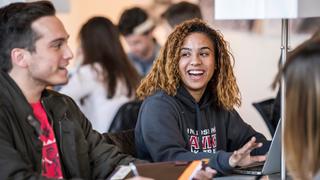Removing Barriers for Future Social Workers: Saint Joseph's New MSW
Saint Joseph’s launches a Master’s of Social Work program that prioritizes student flexibility, paid practicums, zero textbook cost and a diverse curriculum — all in the name of cura personalis.

This fall, Saint Joseph’s University will welcome the first class of students into the School of Education and Human Development’s Master of Social Work (MSW) program. In a way, it’s a program that’s always been missing from the University’s offerings. Saint Joseph’s has a longstanding tradition of prioritizing service and civic engagement among its students, and one of the founding Jesuit principles, cura personalis (care for the whole person), is a basic tenet of social work. So, as Program Director and Clinical Assistant Professor Matt DeCarlo PhD, MSW, and Clinical Assistant Professor of Social Work and Practicum Coordinator Shoshanna Edwards-Alexander EdD, MSW, LSW ’05 began building the program, cura personalis was front and center in their minds — but not just when it came to the curriculum.
When forming the structure of the program, the faculty prioritized things like flexible, asynchronous, online learning, zero textbook costs, discounting opportunities (through the University’s mission discount and alumni discount) and replacing unpaid practicum with paid clinical experiences.
When forming the structure of the program, the faculty prioritized things like flexible, asynchronous, online learning, zero textbook costs, discounting opportunities (through the University’s mission discount and alumni discount) and replacing unpaid practicum with paid clinical experiences.
The zero textbook cost policy was introduced by DeCarlo, an advocate for the Open Education movement, which challenges the financial gatekeeping of knowledge and disposability of academic writing in favor of collective ownership and sustainably applicable scholarship. DeCarlo is the founder of Open Social Work, the largest library of open access textbooks, books and other resources for social work faculty to adopt open education, open access, and open science practices and resources.
“We need to ensure students’ basic needs are met as best as possible so they can actually learn and create the best learning environment possible – that’s our job,” says DeCarlo. “By removing excess costs and engaging students in job market search, offering fully online classes, and providing flexibility in class delivery to accommodate working students, we can help students avoid burnout and better support their success.”
Additionally, DeCarlo, Edwards-Alexander and colleagues are committed to increasing the percentage of paid practicum opportunities and work-based practicums. A standard MSW requirement is the completion of a large number of practicum, or clinical experience hours — 900 to be exact. At most institutions, these hours are completed via unpaid opportunities, which can be challenging for students who need to earn an income while in graduate school. Instead of burdening students in this way, the SJU program seeks to connect students with paid options.
In her role as Clinical Assistant Professor of Social Work, Edwards-Alexander will be connecting students with clinical experiences on and off campus, in addition to teaching in the program.
“Field experience is an integral part of preparing students for competencies in social work practices,” she says.
A former medical social worker and MSW field placement instructor, Edwards-Alexander has worked at the University for over 26 years and knows the unique experiences that Saint Joseph’s can offer to MSW students, including through the renowned Kinney Center for Autism Education and Support.
Through expanded offerings with ACESJU (the Alliance for Catholic Education at SJU), MSW students can also apply for a 2-year residential program serving Catholic education and social service sites throughout the region in exchange for reduced tuition, housing and a monthly stipend.
MSW students will also be encouraged to engage with the campus’ Center for Addiction Recovery and Education and can even opt to apply two of their electives in the program toward obtaining an Addiction certificate.
Hands-on work will be combined with 100% online courses in ethics, diversity and theory, as well as community-based activism and social justice work. For current SJU students, there’s also a 4+2 option that allows psychology, sociology and criminal justice majors to start the program during their senior year.
